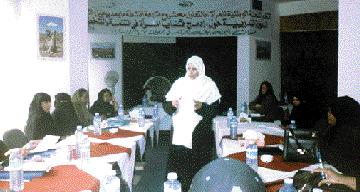
Training Workshop for Coordinators of the WNC [Archives:2000/36/Culture]
September 4 2000

The training is part of the capacity building program for the Women’s National Committee and other women’s machineries, organized by the EU funded Post Beijing Phase II Project. The training workshop followed a one day Consultative Meeting which brought together three major stakeholders,i.e., the Women’s National Committee, the gender focal points in the ministries, and the focal points from different NGOs. The aim behind this meeting was to define the roles of the different stakeholders expected to work closely together for the purpose of integrating women into development.
The meeting was successful in arriving at some consensus pertaining to the responsibilities of each party as well as some clarity achieved on the mechanisms for tackling the different thematic issues concerning women. It was closely supervised by the Chairwomen Ms.Rashida Al-Hamadani and her deputy Ms. Huriya Mashoor.
The Coordinators from different governorates are the representatives of the Women’s National Committee, in their respective governorates, expected to draw up plans for their institution. The training workshop aimed at giving them the skills required in various areas to help them carry out their mandate. Part of it focused on gender analysis and mainstreaming but a large part of it focused on institutionalizing these issues in their organization, and policy analysis A lot of discussion was held on the process of identification and prioritization of the crucial issues in their areas, as well as practical exercises in program formulation which was meant to shed light on the difference between a vision and long term aims, strategy,programs and projects, which have a definite time frame, related to evaluation according to set benchmarks.
The participants in general had expressed the view that for the first time they had attended a workshop on gender which they felt was adapted to yemen and their needs and that they had the opportunity of openly bringing out all the issues of concern to them. In other words, they had felt that the other workshops they had attended on gender elsewhere had been quite far removed from their socio-cultural environment and this workshop had served to dispel a lot of misconceptions. The workshop gave them the technical skills to analyze and mainstream gender within Yemen and the realities of life for Yemeni women, and thus they could adopt it as their own agenda.
Ms.Samira Ali Bin daair the Program Manager, informed us that this was the second training workshop that was conducted by a National Trainer, this time,Dr.Bilqees Al-Sharee, unlike previous trainings held by the Unit. As she explained, the aim is to create a national cadre of trainers, and create self-sufficiency in this area. Of course contracting national trainers and consultants has its pros and cons; some of which are the lack of confidence in national expertise (even though they have a better understanding of the national situation) and such workshops have managed to dispel this notion. Other problems she faced was the fact that according to the UN rules, there is a big gap in consultancy fees between the national Consultants and international Consultants who are not always necessarily the best choice. The justification given by organizations is that it is not sustainable to pay national consultants high rates, but Ms.Daair still thinks that a more reasonable rate needs to be fixed in order to attract the best of national expertise. The materials for each of the workshops are tailor made for the particular target group after a needs assessment is made, from the different resources within Unifem training manuals, and materials and examples added from the Yemeni environment. These manuals will be a national resource to be used by other people for other trainings. This is also related to a small project for a Directory of National Experts in the different thematic areas of gender undertaken by Unifem , and questionnaires have already been distributed to different organizations in Yemen.
Creating close coordination between the different stakeholders working on women’s issues is one of the main objectives of the Post-Beijing Project, which works very closely with the Women’s National Committee on different areas.
——
[archive-e:36-v:2000-y:2000-d:2000-09-04-p:./2000/iss36/culture.htm]


